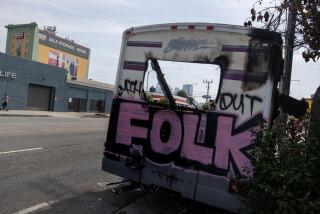City Delays Decision on Carwash Dispute : Thousand Oaks: A panel will draft rules allowing mobile companies and drive-throughs to coexist.
- Share via
A longstanding dispute between owners of drive-through carwashes and roaming free-lance cleaners boiled down to one question Tuesday night: Should a city step in to regulate competition between industries?
Faced with that potentially slippery issue, the Thousand Oaks City Council voted, in effect, to postpone judgment.
In a 4-1 decision just before midnight, the council decided to create a committee with representatives from stationary carwashes, mobile operations and the business community at large.
By mid-April, the committee is to draft regulations that will allow mobile companies to serve customers without unfairly undercutting drive-through carwashes.
In the interim, the council ordered tests of the runoff from parking-lot carwashes to determine whether the water contains pollutants.
“It seems like there ought to be a way for the two businesses to coexist in this city with proper regulation,” Councilman Alex Fiore said. “But we want to ensure that the mobile car washers operate with the fixed-site owners on a level playing field.”
Although Tuesday’s vote postponed final policy-setting until the spring, mobile car washers quickly claimed victory--and drive-through owners grumbled about unfair competition.
“I don’t see how there can be a compromise,” Scott Armstrong, manager of the Janss Mall Car Wash, said. Mobile companies should be allowed to visit residences and wash large fleets, such as taxis or post office trucks, he said. But their practice of soliciting business in industrial parks and commercial offices “should be outlawed,” he added angrily.
Because most of the 50 licensed mobile operations in Thousand Oaks do not offer their employees workers’ compensation and many do not carry insurance, they have low overhead costs.
In contrast, drive-through carwash owners must not only pay those expenses, but also must foot the bill for city-mandated landscaping, handicapped-access remodeling and expensive waste disposal procedures.
To address this imbalance, Fiore suggested a ban on “mass carwashes,” in which mobile crews stake out a busy parking lot and clean dozens of vehicles for $5 each.
But Councilman Frank Schillo, who cast the lone dissenting vote, argued that such interference would be inappropriate.
“It’s extremely unfortunate that we are put in a position between two private (groups) competing with each other--that’s not where government should be,” he said before the meeting. “It’s distasteful to me.”
In nearly two hours of testimony--including a grainy home video of free-lance washers spraying water on cars and letting soapy water flow into storm drains--both sides appealed to the council on practical, environmental and even emotional grounds.
“Shame on you for making it difficult for a young entrepreneur to get a start on life in this town,” Tom Field, a mobile car cleaner with Wash Pro, told the council.
His competitors repeatedly tried to convince the council that mobile operators violate the state clean water act by allowing untreated runoff to trickle into storm drains.
“One argument for this service is that it’s convenient,” Armstrong said. “Well, throwing trash out your window is also convenient.”
Although the effects of soapy runoff are unclear, the Los Angeles Regional Water Quality Control Board told Thousand Oaks last year that washing cars with clean water is safe for the environment. At the hearing, representatives of several large mobile companies said they use only potable water and federally approved soaps.
To bolster their cause, mobile car washers presented about 150 letters of support that customers had faxed to City Hall.
And they applauded when Stephen Meukow, an employee of The Car Wash Guys, told the council that mobile car washers have thrived because they offer a useful service.
“I don’t think there’s anything unfair,” Meukow said, “about building a better mousetrap.”
More to Read
Sign up for Essential California
The most important California stories and recommendations in your inbox every morning.
You may occasionally receive promotional content from the Los Angeles Times.


![Los Angeles, CA - May 19: Carlos Vargas, left, and Paulina Rubio, members of the harm reduction team from Homeless Outreach Program Integrated Care Systems [HOPICS], a leading homeless services and housing agency, look for drug addicts to help and pass out supplies at a homeless RV encampment along 77th St. in South Los Angeles Friday, May 19, 2023. The team hands out syringes, fentanyl test strips, overdose reversal nose spray and medication to prevent overdoses, infection and disease transmission, including the HIV virus. Fenanyl is particularly insidious because it can be found in all other drugs, especially meth and heroin. The handouts are also meant to reduce infection through broken pipes, which can cut users mouths and open them to infection. . (Allen J. Schaben / Los Angeles Times)](https://ca-times.brightspotcdn.com/dims4/default/530e2db/2147483647/strip/true/crop/3900x2608+0+34/resize/320x214!/quality/75/?url=https%3A%2F%2Fcalifornia-times-brightspot.s3.amazonaws.com%2Fe9%2F77%2F4b8bd35d4881a3edec6b945b143b%2F1298639-me-soaring-fentanyl-deaths-24-1-ajs.jpg)







